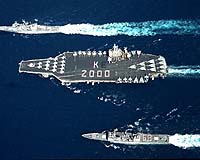| . |  |
. |
Kabul (AFP) May 30, 2010 A huge "peace jirga" set to take place in Kabul this week marks a critical moment in bringing an end to decades of conflict that have blighted Afghanistan, NATO leaders said Sunday. The National Consultative Peace Jirga, or assembly, aims to bring together leaders from across Afghanistan, representing the country's complicated mix of ethnic, tribal, geographic and gender interests. It is due to take place over three days from Wednesday in a tent on the outskirts of Kabul, providing a forum for discussing what steps President Hamid Karzai should take towards brokering a peace deal with the Taliban. "The peace jirga is a critical element, it is a critical moment for this country," Mark Sedwill, NATO's civilian representative in Afghanistan said. The jirga presented an opportunity "to create a national consensus behind the overall approach to security, to governance, to development, to reconciliation, to a political settlement, that everybody here wants to achieve," he said. Up to 1,600 community and political representatives from across the country have begun arriving in the capital to register for the jirga and take part in an orientation programme ahead of its opening. Topping the agenda will be making peace with the Taliban, who have been fighting an insurgency since their five-year regime was toppled by a US-led invasion in late 2001. Karzai promised in his inauguration speech last November, as he began his second five-year term as president, that the jirga would be a cornerstone of his efforts to bring an end to the war, now in its ninth year. He has said he will not negotiate with Al-Qaeda and the Taliban have said they will not hold peace talks until foreign troops leave Afghanistan. Yet he supports a reconciliation process, being bankrolled by the international community, that aims to find jobs for men who fight for the Taliban because they need the money, rather than for ideological reasons. Organisers say Taliban leaders have not been invited to the jirga, but will not be turned away if they do show up. The jirga comes as military planners are preparing to escalate an offensive against the Taliban in southern Kandahar province, where the Islamists had their informal capital during their 1996-2001 rule. "Our strategic main effort is helping the Afghan security forces to grow and our operational priority is to stabilize the security situation in the south," said US General Stanley McChrystal. He emphasised the importance of encouraging Taliban gunmen to return to their communities, saying that military might must be backed by political progress. Karzai's Western backers, including the United States and Britain, have thrown their support behind the jirga, regarding it as an important marker of Karzai's commitment to cleaning up government and creating a transparent society. "This is a big week for Afghanistan, it's an opportunity that has the full support of the international community, and the full support of ISAF and NATO," Sedwill told reporters. NATO and the US have 130,000 troops in Afghanistan fighting the insurgents, with another 20,000 due in coming months as efforts to eradicate them from their strongholds in southern provinces are accelerated. The jirga has been delayed twice from its initial schedule. Security in the capital was palpably tightening Sunday as delegates began arriving. As well as Afghan community leaders, the gathering is expected to attract another 200 invited guests such as diplomats and representatives of international organisations who will act as observers. Organisers have said the delegates will be divided into 13 categories, including lawmakers, clerics, governors, district officials, civil society, refugees, women and the private sector.
Share This Article With Planet Earth
Related Links News From Across The Stans
 USS Eisenhower, 'critical component' in anti-Taliban fight
USS Eisenhower, 'critical component' in anti-Taliban fightOnboard Uss Dwight D. Eisenhower In The Arabian Sea (AFP) May 30, 2010 The planes coming in from missions over Afghanistan for a night landing touch down with a thud, the runway so short and narrow that there is no room for error. It's the deck of the USS Dwight D. Eisenhower, a US Navy aircraft carrier in the Arabian Sea that provides air support for coalition forces fighting Islamic Taliban militants in Afghanistan. The floating airport, or the "city at s ... read more |
|
| The content herein, unless otherwise known to be public domain, are Copyright 1995-2010 - SpaceDaily. AFP and UPI Wire Stories are copyright Agence France-Presse and United Press International. ESA Portal Reports are copyright European Space Agency. All NASA sourced material is public domain. Additional copyrights may apply in whole or part to other bona fide parties. Advertising does not imply endorsement,agreement or approval of any opinions, statements or information provided by SpaceDaily on any Web page published or hosted by SpaceDaily. Privacy Statement |